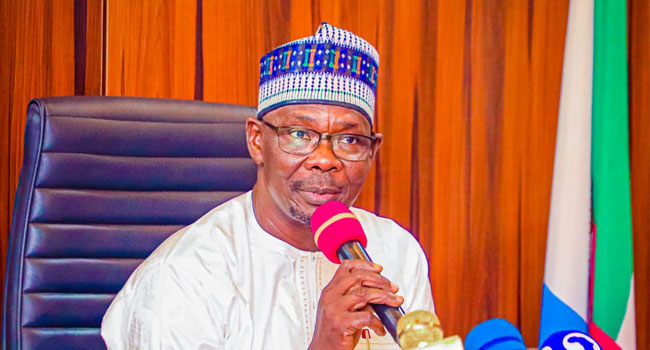To Governor Abdullahi Sule, the Jangwa/Agwantashi rice farm cutting across parts of Awe and Obi local government areas of Nasarawa State, no doubt holds a pride of place.
This is evident in the excitement that trailed the commencement of harvest on the 1,300.hectares cultivated at the beginning of the last planting/cropping season which the governor presided over himself last Tuesday.
The 1, 300 is an addition to the 2000 hectares cultivated in 2024, thereby bringing to 3,300 the number of hectares already put to use from the 10,000 acquired by the state government in its food security drive.
According to Governor Sule, the expansion will be gradual until all the hectares become rice filed covering all the axis in Jangwa and Agwantashi. “By the grace of God next season we will expand by another 2,000 so that at least we‘ll be talking about 5,000 plus hectares. So, this is the idea, we are just going gradually until we reached our target,” he explained.
However, going by the event of the last Tuesday, which saw the entrant of a private sector, Silvex International into the fray, the planned gradual expansion will no doubt be fastwarded with analysts predicting that the existing 10,000 hectares will be just be a drop in the ocean.
The governor himself was taken aback on the situation on the farm when his convoy arrived the scene for the harvest. Trucks of various sizes belonging to Silvex were seen lining up and waiting to move the end products for processing at the company’s facilities located in Kogi and the Federal Capital Territory (FCT). This is no doubt a significant departure from the situation during the last year’s harvest when the state government had to convey the paddies to a location before Olam could purchase the products.
The Silvex initiative is a culmination of a partnership between it and the state government brokered by the state investment development agency (NASIDA) in what analysts believed to be a major step toward strengthening food security and agricultural transformation in the state.
The move was intended for the operationalization of the Nasarawa Agro-Commodity Company (NASACCO): a private-sector-led initiative aimed at driving sustainable growth in the agricultural sector.
Through the partnership, Silvex will off-take rice paddy cultivated on from the Jangwa-Agwatashi Rice Farm, and will process, package, and market the produce as “NASACCO Rice.”
During the harvest flag off, an elated Sule announced to the audience to expect wholly produced rice from the state to be branded as “NASACCO Rice.” in the markets across the country soon.
“The most important thing for the good people of Nasarawa State to know is that Silvex is kind enough to say that they are going to now bag all this rice, the finished products in our name. So, it is going to be „NASACCO Rice“. Next time you go to the market when you see ‚NASACCO Rice‘ then you know it is from here,“ he stated.
The governor viewed the initiative as a realization of a long nurtured vision and a dream come true referencing the popular Oprah Winfrey quote …”to live the life of your dreams”.
“So there is nothing more exciting as Oprah Winfrey has mentioned the best adventure is the adventure where you actually have a dream and you have been able to achieve that dream. Today is a dream that this administration has and we have been able to achieve that dream,” he noted.
To underscore the importance he attached to the farm, Governor Sule also made reference to it while playing host to the management of the LEADERSHIP Group on Wednesday in Lafia, stressing that even though it may appear small, it is the biggest government effort in the North.
“You know we have just had a small farm, 3,300 hectares, even though it is huge in northern Nigeria today because nobody is doing that. But in reality, it‘s small.
“You know, when you go to Brazil, I have gone to Brazil, I have seen farms managed by just a few individuals, and they are talking of 15,000 to 20,000 hectares everywhere. And they are small because you have some that are 100,000 hectares that are being managed by people.
“So that‘s why I say 3,300 is small for us because I have seen more. But it‘s perhaps the biggest today in the country because no state government is actually involved in cultivating and harvesting 3,300 hectares. So that‘s why it means so much to me at the moment,” he stated.
Sule said the state has taken steps further from political agriculture by merely providing implements, fertisers and other logistics to physically engaging in it.





